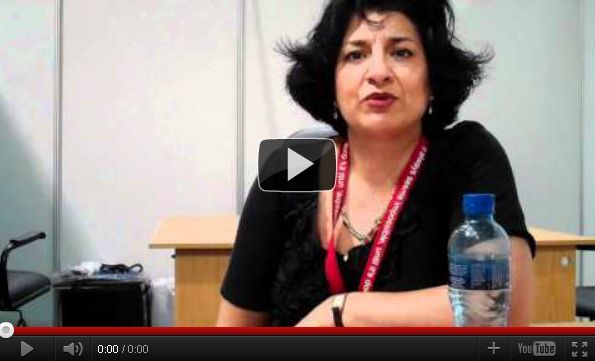Shining a light on something often brings opportunities and responsibilities.
The role of Australia in tackling climate change was in the spotlight today at the UN Climate Summit in Durban, South Africa.
Australia’s Ambassador for Climate Change, Louise Hand addressed the opening plenary on the recent passing of the Clean Energy Future legislation. Quoting Minister for Climate Change, Greg Combet, who will be attending the second week of talks, she raised the importance of decoupling of Australia’s prosperity from pollution and intergenerational equity. Upon finishing, the room broke out into a wave of applause.
This moment was a bright spot in a tense opening session around long-term approaches to tackling climate change. I listened to the EU state that current efforts to tackle climate change would only meet half the amount required to keep warming to below 2°C. African countries pleaded to keep the Kyoto Protocol alive. Grenada spoke on behalf of small island nations about the devastating impacts of extreme events such as drought and storm surges and called on rich countries to take further action to reduce emissions.
Also today, a major analysis of Australia’s climate actions was released in a project funded by Climate Analytics and Ecofys. The project studied whether current or pledged climate action is enough to limit the negative effects of climate change by holding long-term global temperature increase below 2°C. The report showed that Australia needs to do more to ensure warming stays below 2°C let alone the 1.5°C demanded by developing countries in the pacific and parts of Africa.
Australia has pledged a bipartisan unconditional, 5 per cent reduction target by 2020 on 2000 levels. In comparison, Britain – a country which hasn’t weathered the global financial crisis as well as Australia – is aiming to reduce emissions by 50 per cent by 2025.
While some say Australia’s commitment to reduce emissions by 5 per cent is a big enough reduction, the IPCC suggests that rich countries need to reduce emissions by 25 – 40 per cent by 2020 on 1990 levels.
Recent research by the Stockholm Environment Institute, and commissioned by Oxfam, shows that the emission reductions by emerging economies such as China, India, South Africa and Brazil are likely to be slightly greater than the combined efforts of the US, Europe, Australia, Japan, Canada, New Zealand and Russia. Indeed, the report showed that 60 per cent of emission reductions by 2020 are likely to be made by developing countries.
Rich countries such as Australia have an opportunity and responsibility to do more at Durban. Not doing so has the potential to cast a shadow over this year’s UN Climate Summit.
Clancy Moore is blogging from the UN Climate Summit in Durban, South Africa (November 28 – December 9) as part of Oxfam’s UN Climate Tracker project.
You can follow his blogs here



